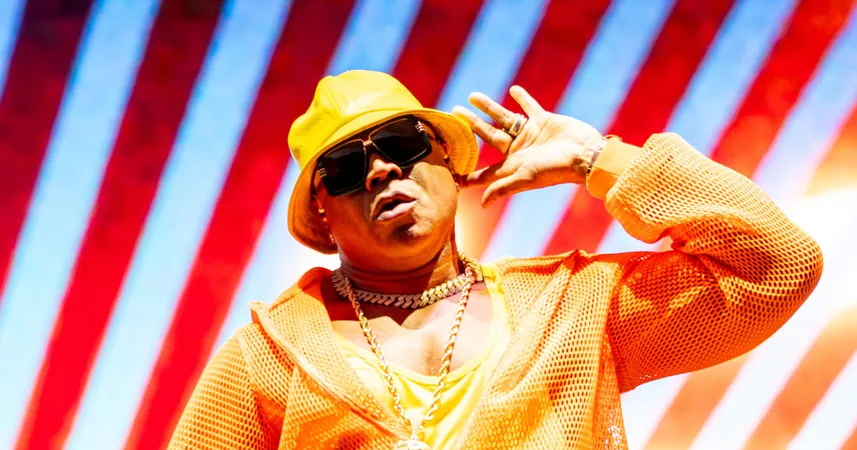
Elon Musk's Controversial Interventions in European Politics: A Closer Look
2025-01-11
Author: Lok
Introduction
Elon Musk, the world's richest individual and owner of one of the largest social media platforms, has not shied away from making bold statements and interventions in European politics, despite his limited understanding of the continent and its diverse nations. Here’s an exploration of significant moments where Musk has crossed the line into the domestic affairs of several European countries, along with an analysis of the potential implications of his actions.
United Kingdom: A Stormy Exchange
Musk's relationship with British politics has been tumultuous, particularly with Labour leader Keir Starmer. Initially, Musk expressed support for the Conservative government under Rishi Sunak, but tensions escalated after Starmer assumed the role of Prime Minister following unrest in the UK during the summer. Musk's criticism has ranged from claiming the UK was a "tyrannical police state" to suggesting that Starmer, whom he derisively labeled "two-tier Keir," should face serious consequences for his alleged failures in handling sensitive domestic issues.
Musk's comments about new inheritance tax regulations were particularly incendiary, as he compared the UK government's actions to Stalinist policies. His accusations extended to calling out notable figures, including King Charles and safeguarding minister Jess Phillips, allegedly for their roles in various political controversies. The culmination of Musk's brazen assertions has raised questions about foreign influence in UK politics and whether online public figures should be held accountable for their remarks.
Germany: Stirring Controversy Ahead of Elections
In Germany, Musk ignited backlash just weeks before a critical general election when he suggested that the far-right Alternative für Deutschland (AfD) party was the nation's only salvation. His op-ed in the prominent newspaper Welt am Sonntag, where he dismissed the party as "extreme," sent shockwaves through the political landscape. German Chancellor Olaf Scholz responded with a sharp rebuke, emphasizing the importance of not engaging with populist rhetoric.
Adding fuel to the fire, Musk recently hosted a controversial livestream with AfD co-leader Alice Weidel that sparked widespread criticism for its extremist content. Weidel's bizarre claim that Adolf Hitler was a communist showcased the dangerous rhetoric that can proliferate on social media platforms. Musk's support for such parties has led to accusations of meddling in Germany's political process, raising concerns over the responsibility social media moguls have in shaping public opinion and electoral outcomes.
European Union: A Clash of Titans
The European Union (EU) has been no stranger to Musk's barbs, especially concerning regulations that threaten his business interests. The Digital Services Act (DSA) has positioned Musk and his platform under scrutiny, with the European Commission's assertions that X is in violation of these regulations. Musk’s criticisms of EU officials, such as the outgoing commissioner Věra Jourová and Thierry Breton, reflect a growing tension between a billionaire entrepreneur and a governing body aiming to regulate digital spaces effectively.
Musk's inflammatory remarks about the upcoming commission being "undemocratic" reveal his desire for a more direct democratic process within the EU. His suggestion that the European Parliament should hold more power signifies a pushback against what he perceives as bureaucratic overreach, even as he continues to navigate his own platform's compliance with the continent's laws.
Broader Implications: The Potential Consequences of Musk’s Meddling
Musk's comments extend beyond individual nations and touch on broader themes of foreign influence and the power of social media in contemporary democracy. With significant political figures drawing attention to the concept of "foreign interference," the consequences of Musk's influential platform could lead to increased regulation and scrutiny of social media in Europe and beyond.
Musk's backing of American political figures and controversial plans, as well as his questioning of judicial decisions in foreign elections, raises an alarming question: How far can a billionaire's influence stretch before it undermines democratic principles worldwide? As we observe Musk's entanglement in European politics, it is clear that the boundaries of intervention in sovereign nations may become increasingly blurred in the digital age.
Conclusion
In conclusion, it’s essential to monitor these developments closely, as Musk’s actions have the potential to transform both the political landscape and the discourse surrounding the responsibilities of influential social media figures.





 Brasil (PT)
Brasil (PT)
 Canada (EN)
Canada (EN)
 Chile (ES)
Chile (ES)
 Česko (CS)
Česko (CS)
 대한민국 (KO)
대한민국 (KO)
 España (ES)
España (ES)
 France (FR)
France (FR)
 Hong Kong (EN)
Hong Kong (EN)
 Italia (IT)
Italia (IT)
 日本 (JA)
日本 (JA)
 Magyarország (HU)
Magyarország (HU)
 Norge (NO)
Norge (NO)
 Polska (PL)
Polska (PL)
 Schweiz (DE)
Schweiz (DE)
 Singapore (EN)
Singapore (EN)
 Sverige (SV)
Sverige (SV)
 Suomi (FI)
Suomi (FI)
 Türkiye (TR)
Türkiye (TR)
 الإمارات العربية المتحدة (AR)
الإمارات العربية المتحدة (AR)